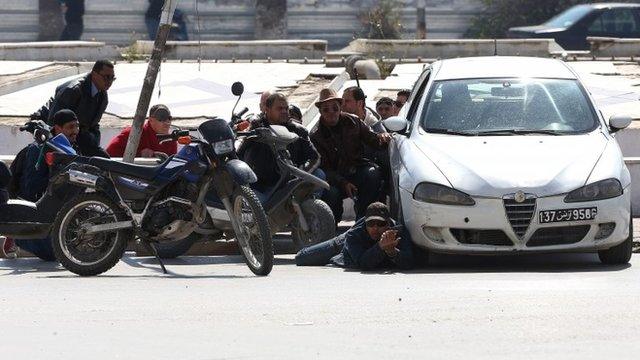Tunis museum attack: President vows to fight terror
- Published
The BBC's James Reynolds: "Tunisia has managed to avoid the larger wars which have hit other Arab states, but this attack... reveals its vulnerability"
Tunisia's president has vowed to fight terrorism "without mercy", following a gun attack on the Bardo Museum in the capital Tunis that killed 19 people.
Seventeen tourists were killed in the attack, including visitors from Japan, Italy, Colombia, Australia, France, Poland and Spain, officials said.
Two Tunisians, one a police officer, were also killed in Wednesday's attack.
Security forces have killed two gunmen but are continuing the search for accomplices.
Officials say that more than 40 people, including tourists and Tunisians, were injured.
'Democracy will win'
President Beji Caid Essebsi said the country was "in a war with terror".
"These monstrous minorities do not frighten us," he said in remarks broadcast on national TV. "We will resist them until the deepest end without mercy.
"Democracy will win and it will survive."
Prime Minister Habib Essid said: "It is a critical moment in our history, and a defining moment for our future."
At the time of the attack, deputies in the neighbouring parliamentary building were discussing anti-terrorism legislation.
Parliament was evacuated, but later reconvened for an extraordinary session in the evening.
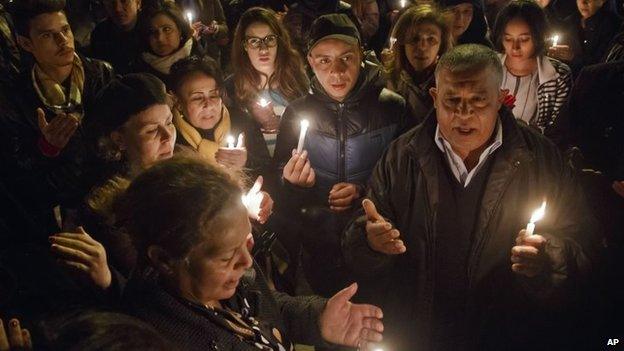
Protesters lit candles and prayed at the gate of the museum
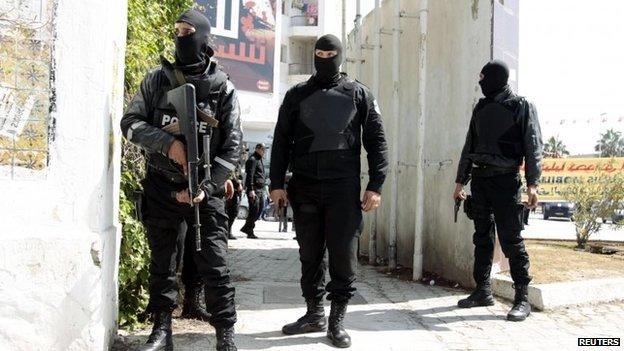
Security forces stormed the museum on Wednesday afternoon
Many Tunisians took to the streets of central Tunis to protest against the attack, waving flags and lighting candles outside the museum.
World leaders condemned the attack and expressed their support for Tunisia's counter-terrorism efforts.
The UN Security Council issued a statement saying no terrorist action could reverse Tunisia's path towards democracy. The statement offered condolences to those affected by the attack, and called for the perpetrators to be brought to justice.
Meanwhile, White House spokesman Josh Earnest said the US would "continue to stand with our Tunisian partners against terrorist violence".
EU foreign policy chief Federica Mogherini offered her condolences (in French), external to the victims' families, and said the EU would "fully support Tunisia in the fight against terrorism".

Who were the victims?
According to Prime Minister Essid, 19 people were killed. However, some of the countries involved have different totals.
Two Tunisians, including a police officer involved in the security operation
Five Japanese were killed, according to Mr Essid - although Japan says it has only confirmed the deaths of three citizens
Four Italians
Two Colombians
Two Spaniards
One national each from Australia, France and Poland
One victim who was not immediately identified

The attack is a huge blow for Tunisia's tourism industry and its government, which only emerged at the end of a long political transition several months ago, the BBC's Arab affairs editor Sebastian Usher says.
Islamist militants have tried to derail the democratic transition, which, although fragile, remains the most positive result of the Arab Spring in the Middle East, our correspondent adds.
Tourism is a key sector of Tunisia's economy, with large numbers of Europeans visiting the country's resorts.
In 2002, 19 people, including 11 German tourists, were killed in a bomb blast at a synagogue in the resort of Djerba. Al-Qaeda said it had carried out that attack.
Concerns about security in Tunisia have increased in recent months as neighbouring Libya has become increasingly unstable.
A large number of Tunisians have also left to fight in Syria and Iraq, triggering worries that returning militants could carry out attacks at home.

The Bardo National Museum
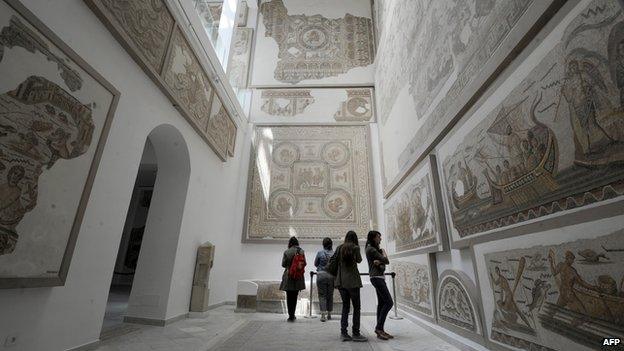
The museum is a major attraction in Tunisia
Tunisia's largest museum, built in a 15th Century palace
Contains 8,000 works, including one of the world's largest collections of Roman mosaics
Some items in the collection are more than 40,000 years old
A new wing was added in 2009, doubling its size


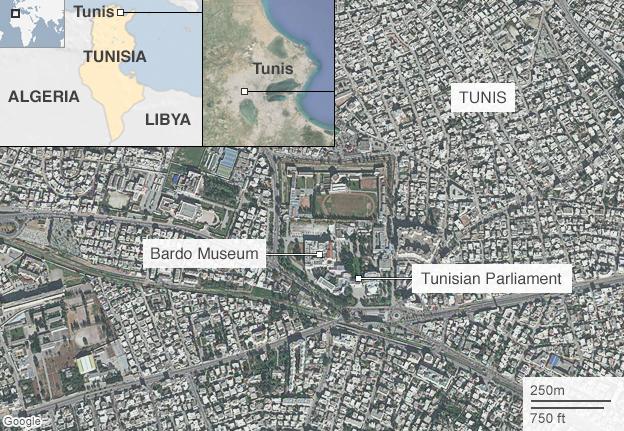

Are you in the area? You can share your experiences by emailing haveyoursay@bbc.co.uk, external
If you would be happy to speak further to a BBC journalist, please include a contact telephone number.
Email your pictures to yourpics@bbc.co.uk, external, upload them here, external, tweet them to @BBC_HaveYourSay, external or text +44 7624 800 100 or WhatsApp us on +44 7525 900971
Read our terms and conditions.
- Published18 March 2015
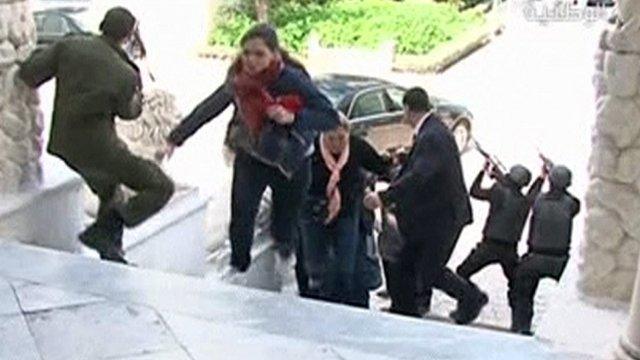
- Published19 March 2015
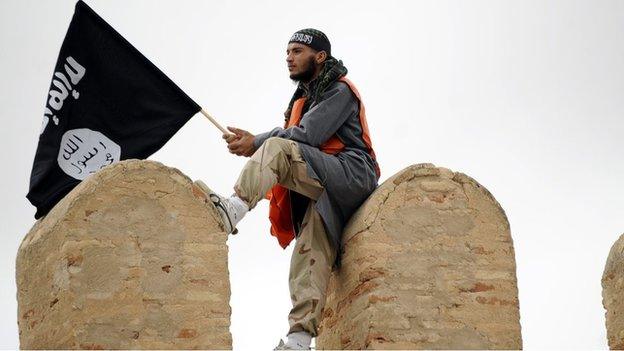
- Published18 March 2015
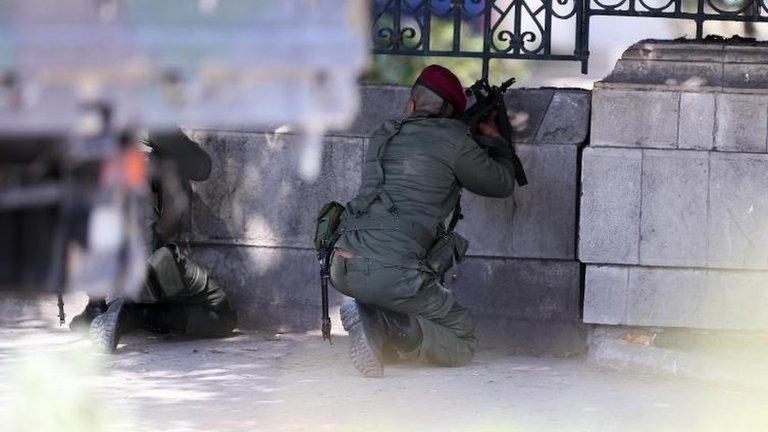
- Published18 March 2015
